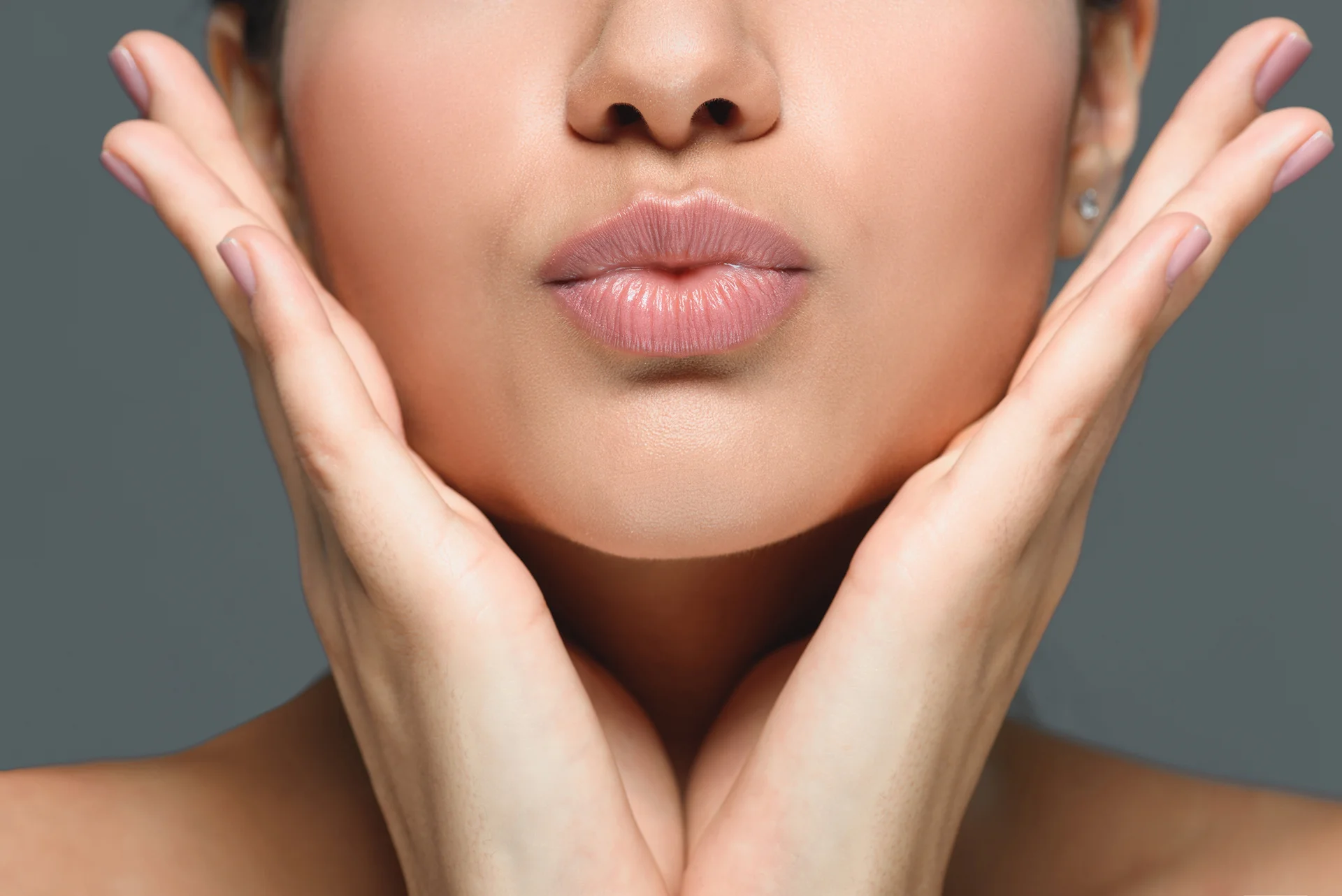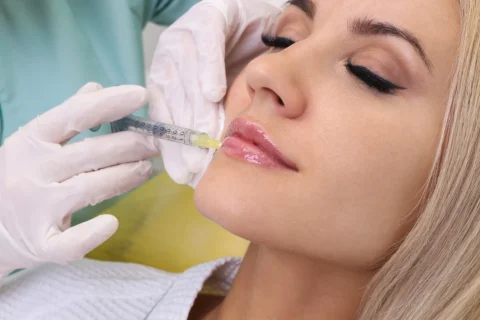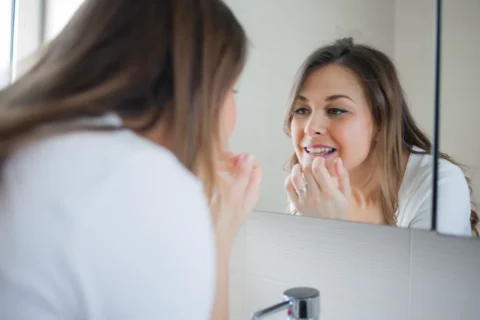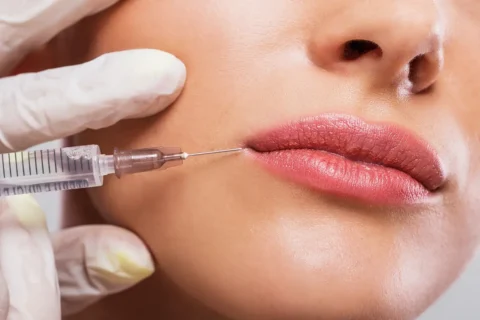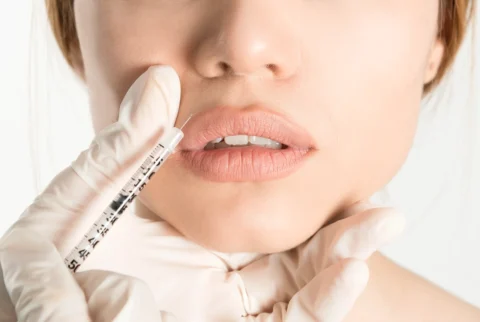Everything You Need To Know About This Post-Injection Reaction
White spots on the lips can sometimes show up after getting filler injections. These dots or patches are usually harmless, but see your doctor if they don’t fade after 2 weeks as they may require medical care.
If you’ve noticed small white spots or bumps on your lips after getting filler injections, you’ve likely been searching online trying to figure out what’s going on. While this phenomenon can be concerning, it is important to understand its potential causes and prevalence.
In this guide, we’ll cover everything you need to know about those white spots after lip injections. We’ll look at the possible causes, whether treatment is needed, and tips to help prevent white bumps on your lips after future filler appointments.
What are White Spots on Lips After Filler?
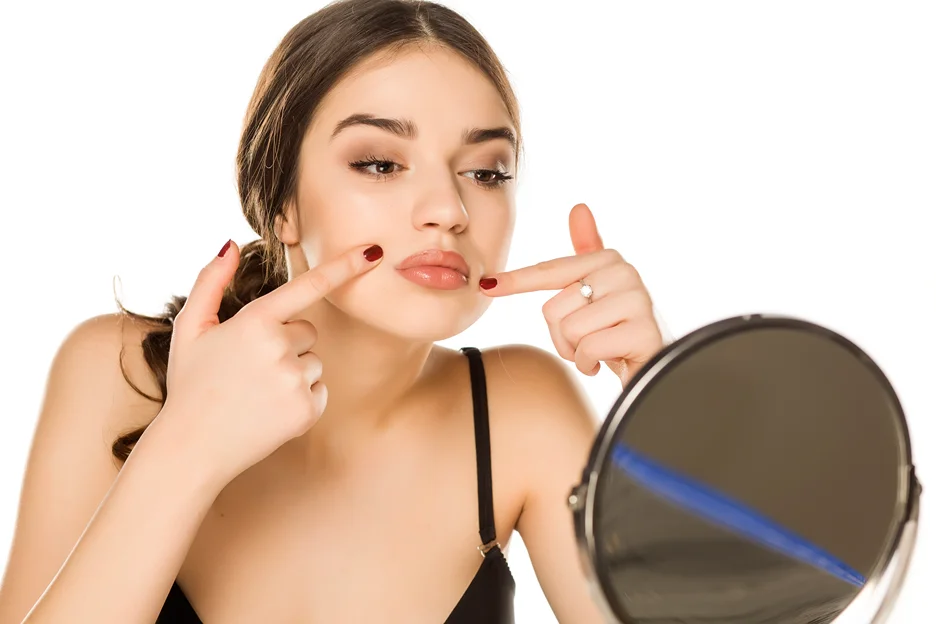
White spots on the lips following a filler treatment typically refer to pale, whitish patches or dots that may appear on the vermilion border (the edge where the lip meets the skin). These spots can manifest as tiny pin-prick marks, larger blotchy patches, or a dusting of white speckles on the lips.
They may appear raised or flat against the surrounding lip tissue, and while the texture is generally smooth, the area might feel firmer or thicker than the surrounding lips.
It’s important to differentiate white spots from other common side effects of lip fillers:
- Bruising: Appears as blue or purple discoloration under the skin.
- Swelling: Involves generalized enlargement of the lips.
- Redness: Characterized by a pinkish flushed hue around injection sites.
While bruising, swelling, and redness are normal short-term effects, white spots may indicate a different issue.
Schedule a consultation with Bellava MedAesthetics to understand the causes of white spots after lip filler. Call us now
Is it Normal to Have White Spots After Lip Filler?
Minor white spots after lip filler injections are relatively common and typically not a major cause for concern. Clinical observations suggest that localized whitening or lightening of the skin can occur, but the prevalence is often reported as lower than 25%.
In many cases, these spots may be attributed to Fordyce spots, which are enlarged sebaceous glands that can become more prominent after filler treatment.
Some factors that can influence the likelihood of developing white spots include:
| Factors | Description |
| Filler Ingredients | Certain fillers, such as calcium hydroxyapatite (Radiesse) or poly-L-lactic acid (Sculptra), may have a higher likelihood of causing whitening effects. |
| Injection Technique | Improper placement or depth during injection can lead to tissue damage or vascular issues, potentially resulting in white spots. |
| History of Lip Conditions | A personal history of cold sores or other lip problems may increase susceptibility to post-filler complications. |
| Genetics and Ethnicity | Individuals with naturally pigmented lips may be more prone to noticing changes in color or texture after treatment. |
| Post-Procedure Care | Hygiene practices and UV exposure can significantly impact healing and the appearance of the lips post-treatment. |
To reduce the risk of white spots, have an in-depth consultation with our experts to discuss your medical history, genetics, past lip issues, and the specific filler ingredients being used. Being proactive will allow us to customize the treatment and aftercare to minimize potential side effects.
How Long Do White Spots After Lip Filler Last?
The duration of white spots varies on a case by case basis. With appropriate treatment, many minor white spots resolve within 7 to 14 days on their own without complications.
More significant white spots may take several weeks or months to fully disappear in some individuals. Factors impacting their persistence include:
- Severity of the initial reaction.
- Type of filler and area of injection.
- Speed of your body’s natural healing abilities.
- Effectiveness of any treatment interventions.
Follow your provider’s advice regarding length of recovery and schedule follow-ups if you have any lingering spots beyond 2 to 4 weeks. Call your doctor promptly if you notice a worsening or spread of the affected area.
Are White Spots After Lip Filler a Cause for Concern?
Mild, short-lived whitening along injection points is usually not a major cause for concern. It is common for patients to experience some localized whitening or lightening of the skin immediately after the procedure. However, unusual or extensive white spots that last for more than two weeks may require evaluation to rule out potential complications, including:
Vascular Occlusion
This occurs when a blood vessel is blocked, either by the filler being injected into it or by a large deposit of filler compressing it. Signs of vascular occlusion include intense pain, significant swelling, and changes in skin color (such as blanching or a bluish-purple hue).
Necrosis
If vascular occlusion is not treated promptly, it can lead to tissue death (necrosis) in the affected area, resulting in permanent damage and potential scarring.
Granulomas
These are inflammatory nodules that can form as a reaction to the filler material. They may appear as firm bumps and can occur at injection sites.
While mild white spots are typically benign, more pronounced or persistent white spots that last beyond two weeks may indicate underlying issues that need medical attention. Therefore, it is advisable to schedule a follow-up visit with your provider for evaluation if you notice moderate to severe white spots that persist.
Let Bellava MedAesthetics’ board-certified providers determine if your lingering white spots need medical attention. Book an appointment today
Treatment and Prevention of White Spots After Lip Filler
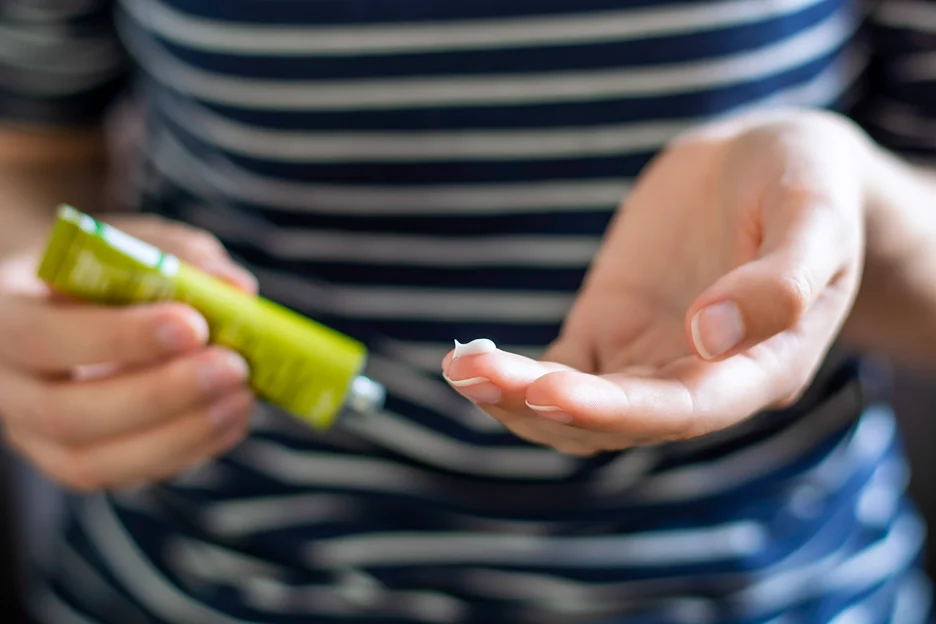
Here are tips for treating existing white spots and preventing their recurrence:
Treatment Options
- Observation
Allow time for mild, short-lived whitening to resolve on its own as most cases will fade within two weeks. If the spots remain unchanged after a couple weeks, pursue additional treatment.
- Topical Hydrocortisone
This can be used for inflammatory whitening to help reduce swelling and stimulate healing. Apply a small amount 2-3 times per day until the inflammation subsides.
- Antivirals
If the whitening is related to a viral outbreak, oral antiviral medications like Valtrex may be prescribed. Typical dosage is 500 mg twice daily for 5-10 days to treat the active viral infection.
- Antibiotics
For bacterial infections, targeted antibiotic therapy based on lab culture results is necessary. Take the full antibiotic course as prescribed even after symptoms improve.
- Hyaluronidase
This enzyme can dissolve hyaluronic acid fillers, potentially reversing ischemia and damage if vascular occlusion is suspected. Several injections may be required for optimal dispersal of the occlusive filler.
- Filler Removal
In cases of severe vascular compromise, extraction of the occlusive filler may be required. This can be done using massage, microneedling, or surgical incision based on the filler location.
Prevention Strategies
Reduce complications with these lip filler precautions:
- Explore filler options to find the best ingredients for your lips. Alternative hyaluronic acid products or lower concentrations can minimize adverse reactions.
- Use conservative amounts of filler to avoid overfilling the lips and increased vascular pressure. Your provider can recommend the optimal syringes for gradual enhancement.
- Request micro-cannulas for a gentler, less invasive injection approach. Their blunt tips pose less risk of damaging delicate lip tissue structures.
- Ensure disinfection of both the lip area and provider’s hands right before injections to prevent bacterial or viral infections.
- Ask about proactive bruise prevention with arnica and Vitamin K to minimize post-procedure purpura.
- If prone to cold sores, request antiviral prophylaxis to suppress potential breakouts triggered by filler trauma.
- Verify your provider’s expertise through board certifications and lip filler before-and-afters to ensure proper technique.
Aftercare and Follow-Up for Lip Fillers

Proper aftercare and follow-up appointments are crucial for monitoring whitening and addressing any complications after lip filler injections. Here are recommended practices:
| # | Tip | Description |
| 1 | Cold Compresses | Gently apply wrapped ice packs to reduce inflammation. Avoid pressing firmly to prevent additional swelling or discomfort. |
| 2 | Avoid Irritants | Refrain from smoking, excessive sun exposure, makeup application, or rubbing the treated area for at least 24 hours post-treatment. |
| 3 | Use Lip Balm | Keeping lips moisturized can help prevent cracking and promote healing. |
| 4 | Take Oral Antibiotics | If prescribed for infection, complete the full course as directed by your provider. |
| 5 | Use Topical Ointments | Apply any topical treatments recommended by your provider to aid healing. |
| 6 | Gently Massage | If advised by your injector, gentle massage can help smooth bumps and distribute filler evenly, but avoid excessive pressure. |
| 7 | Watch for Worsening Symptoms | Seek urgent evaluation if you notice spreading whiteness, severe pain, or numbness, as these may indicate complications. |
| 8 | Schedule Follow-Ups | Your injector will advise on the timing of subsequent appointments to monitor your recovery. |
| 9 | Contact Your Provider | Do not hesitate to reach out if you have concerns about unusual white spots, pain, or other problems arising after lip injections. |
Do not hesitate to contact your provider’s office with any worries about unusual white spots, pain, or other problems arising after lip injections.
Specific Concerns About White Spots
Here we address some common worries patients may have regarding white spots after lip filler:
Are the Spots Permanent?
No, white spots are typically not permanent. Most cases resolve completely within 1 to 2 months, with mild whitening often disappearing within 2 weeks. However, in rare cases, severely ischemic areas could potentially lead to scarring if not addressed.
Do They Cause Pain?
Minimal short-term discomfort is common after lip injections. However, increasing pain, swelling, or redness at the sites of white spots warrants medical evaluation to exclude serious complications, such as vascular occlusion.
Could the Spots Return Later?
Repeat injections carry a small risk of recurrence due to factors like swelling, vascular injury, allergic responses, or poor technique. Adhering to proper aftercare and prevention tips can help reduce this likelihood.
Do I Need to Remove My Filler Immediately?
Removal is rarely required unless there is severe vascular compromise that does not respond to hyaluronidase treatment. Your injector can determine if extraction or other interventions are necessary based on the extent of whitening and associated symptoms.
Will Spots Leave My Lips Discolored?
Most cases will regain a normal uniform color once healed. However, severely ischemic areas could potentially result in slight lightening of sections post-healing in rare instances if blood supply is permanently affected.
Should I Avoid Certain Lip Products?
It is advisable to avoid irritants and harsh products for 1-2 weeks post-procedure as your skin heals. After this period, you may resume your normal lip care routine unless white spots persist.
Get Expert Lip Filler With Bellava MedAesthetics
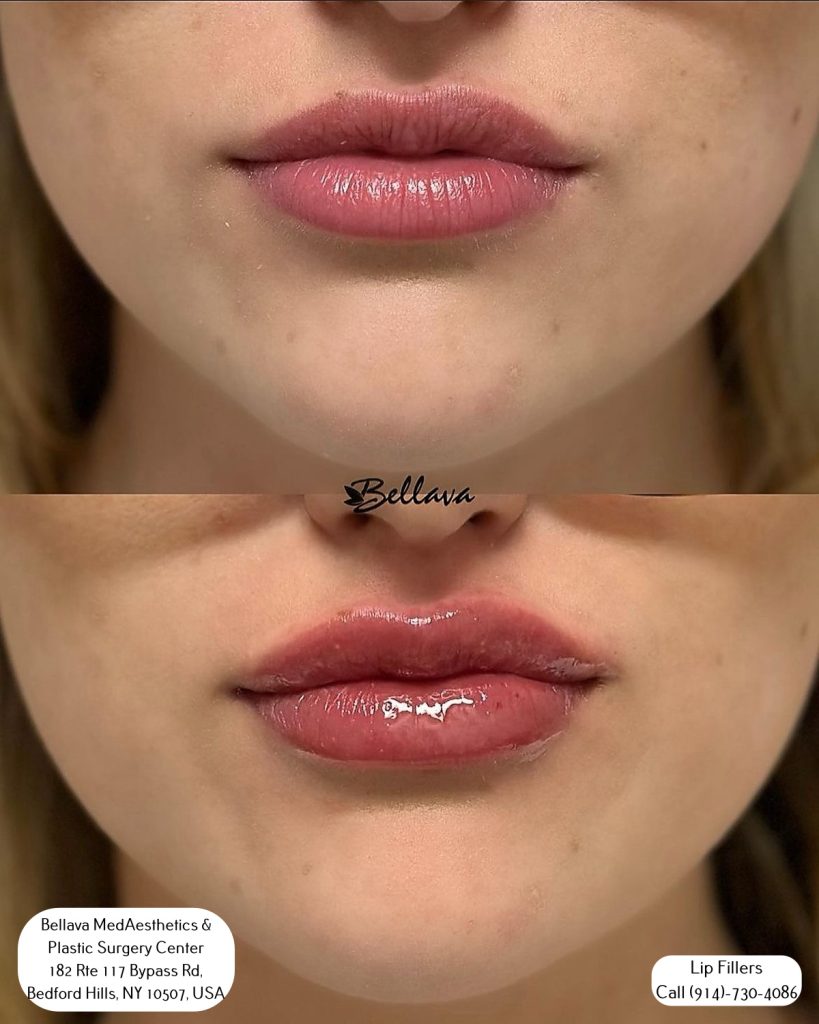
At Bellava MedAesthetics, your satisfaction and safety are our top priorities. Minor whitening after lip filler is common, but significant or lasting white spots could indicate more serious issues needing evaluation.
Our board-certified providers utilize meticulous injection techniques to precisely sculpt beautiful, natural-looking lips while preventing complications like vascular occlusion. We avoid overfilling and customize treatment plans using the highest quality dermal fillers to minimize adverse effects.
Contact Bellava MedAesthetics today to learn more about our individualized lip enhancement services and superior patient care.
